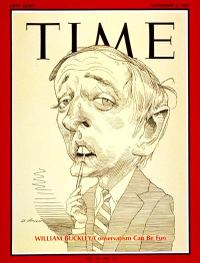One of the great ironies is that journalism, which deals in the eternal now, changes far more slowly than other institutions.
It’s easy to understand when you think about it. You rise as a journalist mainly by pleasing those above you. These decision makers are older. A journalistic institution has very slow turnover in its management class, so barring bankruptcy you’re dealing with people whose formative experiences lie 20-40 years in the past.
Change in journalism, in other words, is generational. The rate of change in an established journalism enterprise has nothing to do with events, nothing to do with reality, certainly nothing to do with how readers’ minds may be changing. Then recall how with each new set of political assumptions one medium tends to rise and another fall — the falling medium digs in its heels as the new medium rises.
Book publishers in the 1890s were slow to credit the journalistic ideas then rising into vogue. Publishers like Mencken were slow to credit film or radio in the 1930s, and Hollywood resented TV in the 1960s.
Yet people in today’s rising Internet thesis, like Digby (above) and Glenn Greenwald, people working every day in today’s rising medium, continue to get their undies in a bunch over the glacial pace of change in TV newsrooms.
They see conspiracies when they’re looking at evolution.
Just as their predecessors on the right did 40 years ago.
The
hardest truth for today’s liberals to accept is that, back in the
Johnson and Nixon years, there was what conservatives termed a "liberal media conspiracy." Although conspiracy was the wrong word. Again,
it was a glacial evolution, with journalists failing to credit the
rising conservative tide because the bosses had evolved their own
worldviews in the 1940s and 1950s, when the Roosevelt Thesis of Unity
was at its height.
(William F. Buckley, left, played the same role in 1968 that Keith Olbermann plays today — an erudite exponent of the new in a media ocean dominated by the past.)
What conservatives have done in response is very interesting. They
deliberately set out to buy, and control, the old media. The Wall
Street Journal wore its right-wing bias as a badge of honor, claiming
they were just balancing "a liberal media." Sun Myung Moon created The
Washington Times, Pat Robertson created CBN, Rupert Murdoch built Fox,
and slowly the parting on the left became a parting on the right. One
that still exists.
My point is they didn’t have to do this. Evolution would have taken
care of most of the right’s complaints. Today’s ostensible "liberal"
voices in the media, whether Chris Matthews or Joe Klein or (god
forbid) Alan Colmes, are in fact mere tools of their right-wing
masters. They have internalized the lessons of Reaganism, the
assumptions of Bushism. They are, at best, anti-thesis liberals, who
will never — so long as they live — understand the underlying change
of this decade or the one to come.
So you have the modern media landscape, a media group which is
literally owned by conservatives "balanced" by a "liberal" media in
psychological hostage to conservatives. Against this rising tide any
journalist of truly liberal thought was always swimming upstream. We
couldn’t get a sniff, on any beat, because the editors were either
brought up in a conservative era, or beholden to conservative bosses.
What Digby, Greenwald and the rest fail to credit, however, is their
own power, and their own medium. While the older medium has been losing
credibility over the last five years, their medium has been gaining
credibility. Millions of people now listen to these new liberal voices,
or echo them, and if Kos or Atrios didn’t exist such voices would still
be writing, and being heard.
That’s how generations evolve. That’s how journalism evolves.
Old thesis falls, new thesis rises, and the old anti-thesis falls alongside it.
Old media falls, new media rises. Just not as fast.
The lesson is simple. People evolve faster than institutions.
Democracy works because it delivers change from the bottom up. And if
you want to be part of the future, it’s best if you’re on the bottom of
the media food chain now. Events will, in time, force editors into
listening to you, admitting you into their midst, replacing them in
time.
Time wounds all heals.














Great post.
Great post.